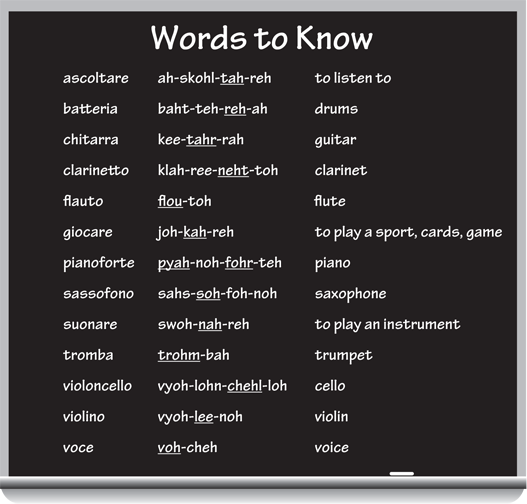Italian All-in-One For Dummies (75 page)
Read Italian All-in-One For Dummies Online
Authors: Consumer Dummies

Emilia:
Mi piace molto ascoltare la musica. E a te?
mee
pyah
-cheh
mohl-
toh ah-skohl-
tah
-reh lah
mooh
-zee-kah. eh ah teh?
I like to listen to music a lot. And you?
Isabel:
Ho molta musica sul mio iPod.
oh
mohl
-tah
mooh
-zee-kah soohl
mee
-oh
ahy
-pohd.
I have a lot of music on my iPod.
Emilia:
Tu suoni uno strumento?
tooh
swoh
-nee
ooh
-noh strooh-
mehn
-toh?
Do you play an instrument?
Isabel:
Suono il violoncello e il pianoforte.
swoh
-noh eel vyoh-lohn-
chehl
-loh eh eel
pyah
-noh-
fohr
-teh.
I play the cello and the piano.
Emilia:
Sei brava?
sey
brah
-vah?
Are you good?
Isabel:
Si, mi piace molto suonare. E a te?
see, mee
pyah
-cheh
mohl
-toh swoh-
nah
-reh. eh ah teh?
I guess so. I really like to play music. And you?
Emilia:
Suono il flauto, ma preferisco cantare nel coro.
swoh
-noh eel
flou
-toh, mah preh-feh-
rees
-koh kahn-
tah
-reh nehl
koh
-roh.
I play the flute, but I prefer to sing in the chorus.
Â

 And when you say you like something, use the verb
And when you say you like something, use the verb
piacere
(pyah-
cheh
-reh). This verb is a bit different because you usually use it only in the third person singular or the third person plural of any verb tense.
 Third person singular:
Third person singular:
If what you like is singular or an infinitive:
Mi piace correre.
(mee
pyach
-eh
kohr
-reh-reh.) (
I like to run.
)
Mi piace il mare.
(mee
pyach
eel
mah
-reh.) (
I like the sea.
)
 Third person plural:
Third person plural:
If what you like is plural:
Mi piacciono gli sport invernali.
(mee
pyach
-choh-noh lyee spohrt een-vehr-
nah
-lee.) (
I like winter sports.
)
Only your pronouns change, which are indirect object pronouns and literally mean “such and such a thing is pleasing to me.” These are
mi, ti, gli, le, ci, vi,
and
gli
/
loro
(mee, tee, lyee, leh, chee, vee, lyee/
loh
-roh) (
me, you, him, her, us, you,
and
them
). You don't use personal pronouns (
io, tu, lui, lei,
and so on) with the verb
piacere.
(Turn to
Chapter 4
in Book IV for more on the verb
piacere.
)
Speaking Reflexively
 When you say “to enjoy yourself,” you use a reflexive verb. That is, you turn the action back to yourself. The same applies in Italian. But not all Italian reflexive verbs are reflexive in English, and vice versa. Some verbs, such as
When you say “to enjoy yourself,” you use a reflexive verb. That is, you turn the action back to yourself. The same applies in Italian. But not all Italian reflexive verbs are reflexive in English, and vice versa. Some verbs, such as
riposarsi
(ree-poh-
zahr
-see) (
to rest oneself
) and
svegliarsi
(zveh-
lyahr
-see) (
to wake oneself
), are not reflexive in English, although they are in Italian.
In Italian, you can tell whether a verb is reflexive by looking at the infinitive form. If the last syllable of the infinitive is
-si
(
see
), which translates as
oneself,
then the verb is reflexive. When you conjugate a reflexive verb, you must change the last syllable from
-si
to something else. The following conjugation of
divertirsi
(dee-vehr-
teer
-see) (
to enjoy oneself, to have a good time
) demonstrates the conjugation of the verb. The only difference is that you add the reflexive pronoun, which refers to the person concerned (the subject). After you have removed the
-si
at the end of a reflexive verb, you conjugate it just like any other
-are, -ere,
or
-ire
verb. Notice how
divertirsi
becomes a regular present tense
-ire
verb, with the exception that you then need the reflexive pronouns.
Conjugation | Pronunciation |
mi diverto | mee dee- |
ti diverti | tee dee- |
si diverte | see dee- |
ci divertiamo | chee dee-vehr- |
vi divertite | vee dee-vehr- |
si divertono | see dee- |
Here are some more examples:
 divertirsi:
divertirsi:
Mi diverto molto a cantare.
(mee dee-
vehr
-toh
mohl
-toh ah kahn-
tah
-reh.) (
I really enjoy singing.
)
 annoiarsi
annoiarsi
(ahn-noh-
yahr
-see) (
to be bored
):
Vi annoiate in campagna?
(vee ahn-noh-
yah
-teh een kahm-
pah
-nyah?) (
Do you get bored in the country?
)
 svegliarsi
svegliarsi
(zveh-
lyahr
-see) (
to wake up
):
A che ora ti svegli?
(ah keh
oh
-rah tee
zveh
-lyee?) (
What time do you wake up?
)
